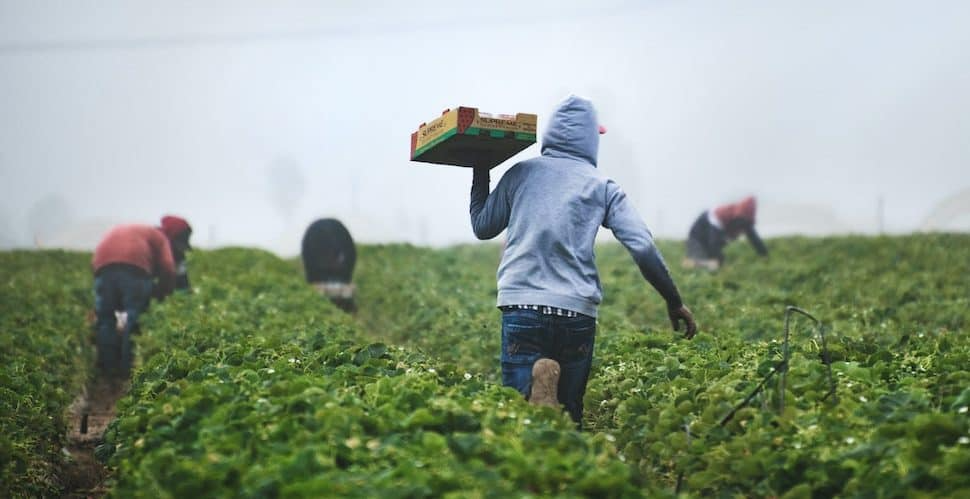Legal loophole allows child labor exploitation in the U.S.

In the U.S., it is legal for children as young as 12 to work unlimited hours outside of school with parental approval if they're working in agriculture. There are currently around 500,000 children who work in agriculture, planting, picking, and packaging crops.
Even children protected by the American Fair Labor Standards Act (FLSA) are at risk of being exploited by employers breaking the law. Reportedly the number of children employed in violation of U.S. child labor laws increased by 37% in 2022.
Child labor exploitation leads to school drop outs
Worse yet, worker shortages and supply chain challenges have companies and lawmakers trying to beat back the minimal existing child labor protections.
As the hours for child labor get extended, school drop out rates increase with kids unable to upkeep their work and study schedules.
Melissa Hope Ditmore, author of Unbroken Chains: The Hidden Role of Human Trafficking in the American Economy, told TruthOut,
“Kids who come from El Salvador, Honduras or Guatemala do not find their way to Iowa by accident,” she says. “They either know someone who is already there, perhaps a family member or someone from their hometown who agrees to be their sponsor, or they're offered a job by someone — a middleman — who has a vehicle and says that he'll take them to a farm, factory, or other worksite. Sometimes these middlemen hang out at children's detention facilities or immigration holding centers and recruit people the minute they're released. The vast majority of kids drop out of school; even if the sponsor promises to enroll them, they don't always follow through.”
“Most people want to be honorable, and even if they suspect that the debt is bogus, they want to be free of it. They may not be in actual debt bondage, but they may fear that they or their families will be harmed if they don't pay. There is no safety net for these kids, and it is not uncommon for them to go hungry or fall in with people who exploit them. Going to school may not even be on their radar.”
To address child labor exploitation, address poverty
Reid Maki, coordinator of the Child Labor Coalition, is adamant that child labor exploitation would be less likely to happen if people were paid adequate wages. He says, for instance, that paying agricultural workers by the bucket instead of by the hour to pick crops encourages risk taking. “It's inhumane. If adults were paid an adequate hourly rate, it would make an enormous difference, and families would be able to keep their kids in school. If they ended the piece rate, I believe child labor on farms would be reduced or even disappear.”
“Everyone says they want to protect children from labor exploitation but … until we eliminate poverty, we are not really addressing the problem.”
This “Eyes on Trafficking” story is reprinted from its original online location.
Fair Use Notice: The PBJ Learning Knowledge Vault is dedicated to advancing understanding of various social justice issues, including human trafficking and related topics. Some of the material presented on this website may contain copyrighted material, the use of which has not always been specifically authorized by the copyright owner. We are making such material available in our efforts to promote education and awareness of these important issues. There is no other central database we are aware of, so we put this together for both historical and research purposes. Articles are categorized and tagged for ease of use. We believe that this constitutes a ‘fair use' of any such copyrighted material as provided for in section 107 of the US Copyright Law. In accordance with Title 17 U.S.C. Section 107, the material on this site is distributed without profit to those who have expressed a prior interest in receiving the included information for research and educational purposes. For more information on fair use, please visit: “17 U.S. Code § 107 – Limitations on exclusive rights” on Cornell Law School's Legal Information Institute.
 ABOUT PBJ LEARNING
ABOUT PBJ LEARNING
PBJ Learning is a leading provider of online human trafficking training, focusing on awareness and prevention education. Their interactive Human Trafficking Essentials online course is used worldwide to educate professionals and individuals how to recognize human trafficking and how to respond to potential victims. Learn on any web browser (even your mobile phone) at any time.
More stories like this can be found in your PBJ Learning Knowledge Vault.
EYES ON TRAFFICKING
This “Eyes on Trafficking” story is reprinted from its original online location.
ABOUT PBJ LEARNING
PBJ Learning is a leading provider of online human trafficking training, focusing on awareness and prevention education. Their interactive Human Trafficking Essentials online course is used worldwide to educate professionals and individuals how to recognize human trafficking and how to respond to potential victims. Learn on any web browser (even your mobile phone) at any time.
More stories like this can be found in your PBJ Learning Knowledge Vault.
